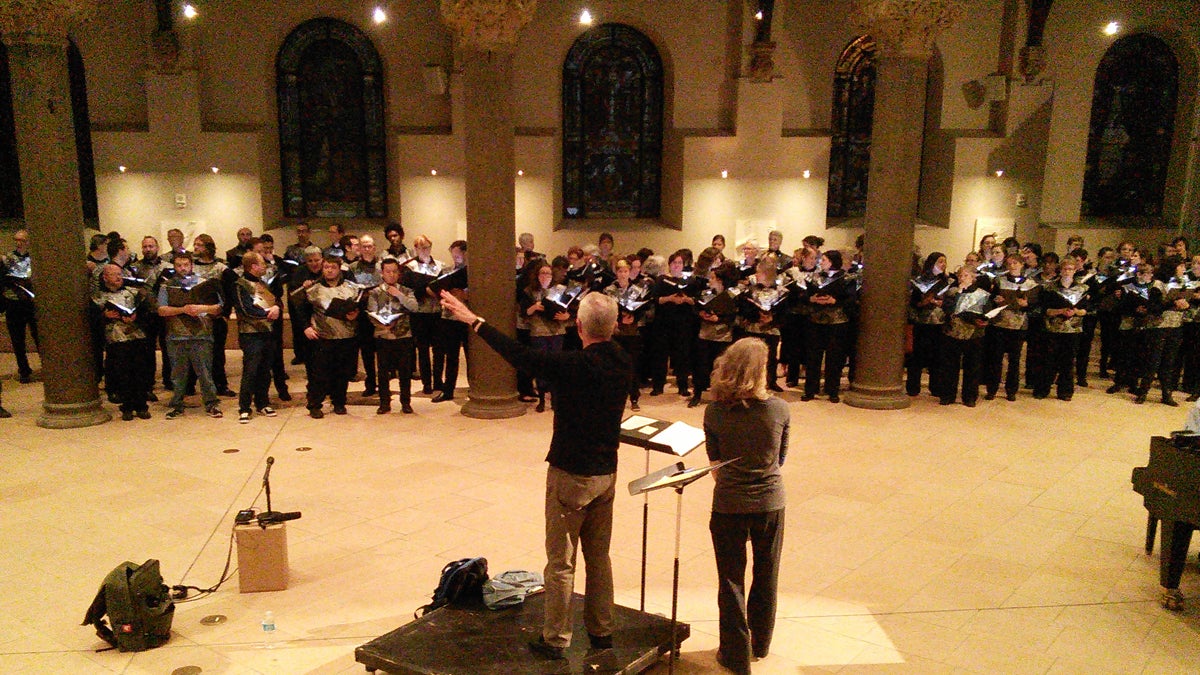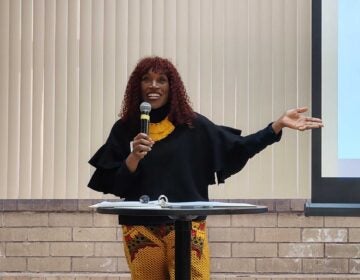Digging through the past to set Pennsylvania coal miners’ stories to music
Listen
The Mendelssohn Club during a rehearsal of "Anthracite Fields," composer Julia Wolfe's first Philadelpha-based commission (Peter Crimmins/WHYY)
Editor’s note: Philadelphia-area resident Julia Wolfe has been selected to receive the Pulitzer Prize for distinguished musical composition that had its first performance in the U.S. during the year. We’re republishing this story from April 2014 about that premiere performance.
Composer Julia Wolfe grew up Montgomeryville, about 30 miles beyond Philadelphia.
“Not quite a suburb, further out than that. It had a little Main Street, a bowling alley, the whole thing,” said Wolfe, now a New Yorker. “Down this long country road, at the very end of it, was Route 309. And I always turned right.
“Turn right on 309, that’s south, and you head into Philadelphia. I rarely turned left,” she said. “And I thought, what’s left? What’s up that way?”
Up that way, a left turn north on Route 309, is coal country. It’s where Wolfe has spent a lot of time the last couple years gathering material for her new composition, “Anthracite Fields.”
The work for chorus and small orchestra is based on interviews with descendants of coal miners, descriptions of life in company towns, and historical documents.
The first movement, “Foundation,” features a list of the dead.
“I found this index — Pennsylvania Coal Mining Accident Index,1890-1916. It’s sadly long — a really long, long list of names,” said Wolfe. “I just picked out the Johns and one-syllable last names in alphabetical order. So you have John Ash, John Ayres, John Baines, John Bates …”
Baritones chant those names with a slow cadence, then the tenors hop on top of them, moving slightly faster. Shortly thereafter, the sopranos carry the names to the rafters of the cathedral.
“One-syllable names are very clear, and you can get a rhythm out of the single syllable,” said Wolfe. “At the end I go to multisyllabic names — you get a sense of ethnicity: Missimina Santiorelli, Jonathan Seaberry, Ezekiel Zamacona — lots of Italian names are fantastic, as are eastern European names. Sladovich and names like that. Singing these names is very emotional.”
Discovering the sounds of underground
This weekend at the Episcopal Cathedral in West Philadelphia, the Mendelssohn Club will premiere “Anthracite Fields,” Wolfe’s first Philadelphia-based commission. A co-founder of the New York City-based new music project Bang on a Can, Wolfe’s premiere will feature six instrumentalists from the Bang on a Can Allstars.
“There are bang-y moments,” said Wolfe, who got ideas for sounds during a visit to an historic underground mine in Northeast Pennsylvania. “What is the sound of being that low down in the earth? I worked a lot with the guitarist Mark Stewart, who is in the Bang on a Can Allstars. He uses this kitchen wire whisk, strumming with the whisk. It just reverberates. It’s an incredible sound.”
Wolfe’s interest in coal mining grows from her previous project, “Steel Hammer,” a work about the folk hero John Henry and American labor. “I’m still obsessed with who we were as Americans, American workers,” she says.
“Anthracite Fields” includes a section called “Breaker Boys,” featuring street rhymes about children hired to sort coal from broken rock. Many of them were killed or maimed by the work. There is also text from a speech by labor organizer John L. Lewis, who argued that America owes protection to coal miners and security to their families if they are killed.
“That area in Pennsylvania is really unique. This anthracite coal is the diamond of coal, it’s super-clean — or, as clean as coal can be, let’s put it that way. It basically fueled the nation,” said Wolfe. “We now live in comfort, incredible comfort. It’s not meant to be heavy-handed, but it’s not ‘them over there,’ it’s ‘us.’ I wanted to get that point across.”
Wolfe has some background in Appalachian music (she used to play dulcimer and bones) but composes in the vein of new music, pushing minimalism to sonic extremes. “Anthracite Fields” is unapologetically avant-garde, which may not resonate with the people it’s written about.
“I’m writing things outside the box. I’m trying to take music to someplace new,” said Wolfe. “It’s a weird melding of being close to home and going somewhere you’ve never been before. I wonder how the people I interviewed will hear this. Is this going to sound crazy to them?”
WHYY is your source for fact-based, in-depth journalism and information. As a nonprofit organization, we rely on financial support from readers like you. Please give today.





